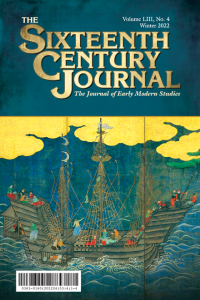Author: Fisher, Alexander
Publication details: Sixteenth Century Journal, Volume 53, Issue 4, Winter 2022, pp. 915-942

Weblink: https://doi.org/10.1086/SCJ5304002
Description: In the charged religious context of post-Reformation Germany, debate ensued about the power of weather bells to disperse the thunderstorms traditionally thought to be the work of demons and witches . Catholics and Protestants alike inherited medieval notions of demonic agency in the atmosphere, but they differed on the appropriate remedy . Protestant critics ridiculed the consecration of bells as a corruption of baptism and rejected their sonic agency as a violation of God’s providence, retaining weather bells as a compulsion to the collective prayer that alone could assuage God’s wrath . Defenders of Catholic practice, however, rehearsed medieval arguments for bell apotropaism and insisted on their efficacy against storms, appealing variously to their consecration or to the prayer they compelled . If published Catholic opinion shifted markedly against apotropaic sound in the Enlightenment, local populations continued to hear weather bells in traditional ways, and to posit bells as powerful deterrents against demonic listeners